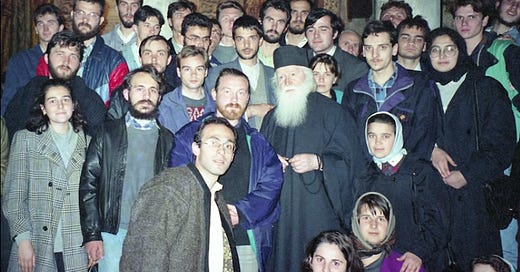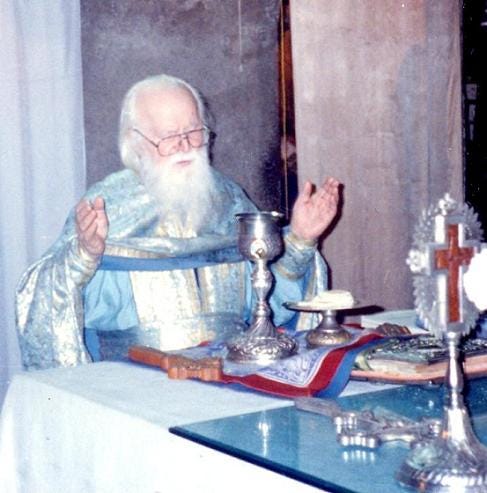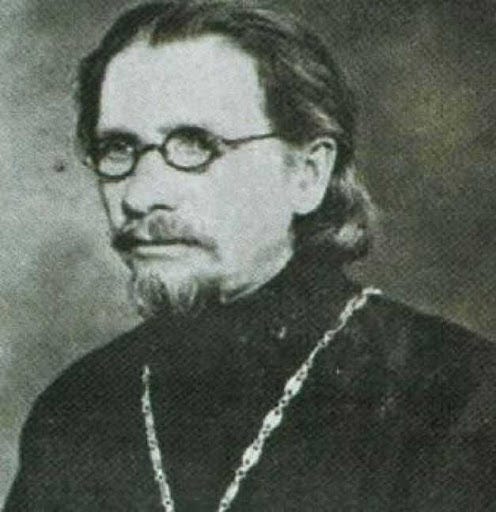Elder Sofian: May the Whole World Be a 'Burning Bush' of Prayer!
Pray with “Lord Jesus'' and, slowly but surely, a passageway, a path of light, will appear between the mind and heart and you will feel this great inner peace and joy.
A talk addressed to a group of students
Bucharest, March 10, 1993
At Antim Monastery in Bucharest, not during the time of the Babylonian or the Egyptian captivity, but during the time of the Communist captivity, a spiritual life was preserved without interruption with the help of God. The services were continuous, especially the Divine Liturgy which is very beneficial for all of humanity. With all the threats hanging over our heads, the Divine Liturgy was done daily.
As you know, the communists came to power in 1945 and installed themselves with great boldness. They changed all of the ordinances that had existed up until then through a kind of societal “renewal,” which in fact would go on to pervert our Romanian and Orthodox Christian identity, it would go on to change it into hatred toward God and into unbelief. Moses once wanted to free his people from captivity in Egypt and for them to all go pray in the wilderness. But Pharaoh did not give them permission. (Exodus 5:1-5) Once the communists came to power, prayer was not really allowed here either. Many monasteries were greatly oppressed, at the same time as great disturbances and changes to the country’s ordinances took place.
Recollections of the “Burning Bush” Movement
In a similar atmosphere of pagan and atheist pressure on the Romanian soul, a Christian flame and a cry to God was born at Antim Monastery in Bucharest. I am talking about the “Burning Bush,” which was held from 1945-1948. That is, after Vespers (especially Sunday evening when very many people would come), we would enter the monastery library and there we would hold these conferences on the spiritual life, while outside the communists’ hatred raged. For example, one week we would interpret the Divine Liturgy in different ways. One day, someone talked about the Divine Liturgy in history. Another day (of the same week) they talked about the Divine Liturgy as a sacrifice. Another spoke about the Divine Liturgy in iconography; another about how it was expressed musically; another about the mystical understanding of the Divine Liturgy (what occurs in the Holy Chalice or on the Holy Paten). Very many people would come to listen to these interpretations. Communist informers, who took notes to add to a file, blended among the Christians. Political problems were not discussed. We knew that there was no point in doing such a thing, since the country was occupied by a foreign army.
The speakers were priests who knew Orthodox teachings very well, and their words had very much power and influence over the listeners, because such interpretations truly interested the entire audience. Notable speakers came from all over the capital. There was Father Benedict Ghius, a Doctor in Theology with superb studies in France. His very presence, gentleness, and spiritual depth brought a host of new understandings, which comforted everyone’s soul. There was Alexandru Mironescu—journalist and professor of Physics, Chemistry, and Philosophy. When he would explain a spiritual subject, he would not only fill our minds, but also our hearts with joy and spiritual comfort. Another was Paul Sterian, a well known author; another, Ion Marin Sadoveanu (for a time he was the director of the Theater in Bucharest); another, Vasile Voiculescu, a writer, doctor, and especially a man of profound Christian experience. Similarly, Alexandru Elian, a professor of Byzantine Studies, and a man of very great spiritual depth, also participated. All of them brought treasures from their wealth of true knowledge for those who thirstily listened to the conferences. All spoke about the soul, about the spiritual life of man.
An invisible flame burned, being lit on the Holy Altar table, from the heart of the Divine Liturgy, and it encompassed all the speakers with its light, as well as the listeners who gathered in the monastery library. This group of preachers took the name “Burning Bush.” The principal problem which we discussed—from the practical, historical, and mystical point of view—was the Divine Liturgy in the Holy Altar, as well as the Jesus Prayer. Thus, from the Holy Altar to the altar of the heart; because the heart is the true liturgical celebrant! That is, an inner liturgy exists within each of us and it is continually served. This is the ideal; an ideal that is easy to fulfill if there is a desire for the Jesus Prayer in the heart.
Father Ioann Truly Prayed Unceasingly
In 1945, Father Ioann Kulighin arrived in Bucharest, like a gift sent from God. He had grown up in Russia. He had been a novice at Optina, a renowned monastery in Northern Russia. And he came here with Metropolitan Nicolae of Rostov, having withdrawn to Germany after the Germans’ defeat. The Metropolitan, out of fear that the Russians would take revenge on him (since he was considered a “friend” of the Germans), left his country, taking a small spiritual retinue with him, of which Father Ioann was a part. Patriarch Nicodim received them with love. They were housed at Cernica; and they had a little house on an isle, close to the Church of Saint Nicholas. Each week, Father Ioann would come to Antim from there and would take part in these meetings. I will tell you something very important. This Father Ioann, from when he was little, from a very young age, had mastered the Jesus Prayer. Father Ioann prayed unceasingly. Optina, where he was raised, was a very spiritual place with elders who practiced this prayer of the heart. And I tell you that until I met Father Ioann, I had not met a priest or a Christian who truly had unceasing prayer. For example, Father was asked about different things about his country, about communist Russia, about his life (he had suffered greatly in the communist prisons). And while he was engaged in these responses, I put my hand on his shoulder and asked him: “Father Ioann, are you praying now?” “Yes, Father, I am praying,” he responded to me. Even though he was speaking with others, in the midst of an explanation, his heart was praying. And this did not only occur during the day, but also at night, all the time. His heart prayed with this short prayer. For many years, Father Ioann’s calling on the Lord had descended from the mind into the heart. He prayed when he talked, when he ate, and when he walked. Prayer was like breathing for him. He prayed in his sleep too. I know this from him, actually. I would host him in my cell from Saturday to Monday, and I would speak with him about many things that were truly beneficial for me.
He was a very luminous man, in his mind and face. When you saw him, you thought that you wouldn’t put any money on him, you didn’t realize what spiritual value he had. He was small, he had a thin beard, glasses, long, blonde hair; he wore a poor cassock, he was very modest. But when you drew near to him and asked him about spiritual things, he responded masterfully, since he was full of this great grace of unceasing prayer.
He contributed very much to the strengthening of the “Burning Bush.” The Russian communists took him from Cernica in January 1947. They condemned him to prison for life, considering him a traitor to the country and a war criminal. He was taken to Odessa. He was with brother Leontie, a Basarabian and Father Ioann’s translator. Brother Leontie sent me a postcard which ended with the prayer “Lord Jesus.” This postcard passed all the communist censures and arrived at Antim. Father Ioann died at Odessa, but they sent brother Leontie to Siberia. Metropolitan Nicolae is buried at Cernica Monastery.
I spoke to you about Father Ioann since he was a great spiritual treasure for us all. He was also a great man of prayer and a very good advisor. He knew the Philokalia and the Holy Fathers, similar to how Father Cleopa knows and recites from memory entire pages of Saint Maximos the Confessor. He also had this unceasing prayer, which, said for much time and with great attention, fixes itself somewhere in our heart; and there can be no greater joy for someone than the joy he feels when this prayer works in his heart.
The meetings at Antim existed for a long time, without being called the “Burning Bush.” It was natural for the faithful to receive advice, comfort, and spiritual guidance at Antim Monastery, despite all the informants who came to Church and were afraid about who knows what we were saying against the communist regime.
When the “Burning Bush'' movement took shape, its author was Sandu Tudor, who at Antim became Hiermonk Agathon (in Greek, “agathon” means improved). Later, he became Hieroschemamonk Daniil Teodorescu. He was an erudite man and a true practitioner of the Jesus Prayer. If Father Daniil had not inscribed this movement at the Tribunal, we may have not been imprisoned. All of us were taken—seventeen monks and novices—and sent to prison in the name of the “Burning Bush.” I remember that in the interrogation I was asked something like this: “Oh, you’re the ones who light fields on fire outside the city, and you threaten those of us from the leadership?” I responded: “No, sir. I never set a field on fire...”; and I told them about this page in Scripture which talks about Moses and the bush which was not consumed. They, poor people, were not at all informed, but were thinking about who knows what we could be up to there, some monks and novices from Antim. Thus, this movement, like Moses’ movement in Egypt, truly was against the spirit of Pharaoh. We, however, were against the spiritual works of the communists who sought the de-Christianization of souls.
The Union of Mind and Heart
I will tell you a few things about the Jesus Prayer, or the Prayer of the heart, as it is also known. It’s content is very short: “Lord Jesus Christ, Son of God, have mercy on me a sinner.” Some seek to practice this prayer, but with influences foreign to its spirit: a mix of yoga and other currents of Eastern spirituality, which are very harmful and falsify prayer. To correctly learn this prayer, I recommend three books: The Way of a Pilgrim, The Art of Prayer, and Volume 5 of the Philokalia which especially focuses on the Prayer of the heart. Whoever practices the Jesus Prayer following the instructions of these books will go on a sure and good path. Whoever follows other instructions may make mistakes.
This prayer is very simple, but it must be said as often as possible, day and night if it is possible. You can read in the Way of a Pilgrim that at a given moment, the elder tells this pilgrim to say the prayer 3,000 times a day, then 6,000 times, then 12,000 times, and this pilgrim did as he was told and progressed very much. Read this book. It is very engaging, you feel the spirit of prayer in it, and when you read it, it seems like you have acquired the prayer. I read it in one breath.
This prayer can be said in a whisper or silently, but with an effort that each word of the prayer falls on the place of the spiritual heart. In the right part of the chest, two fingers higher than the nipple, is the center of our spiritual being. The words of the prayer must fall on this place, and then it is said calmly, with very much benefit, until, with the help of the Good God, the mind descends into the heart.
For this is the aim of the Jesus Prayer: to unite the mind and heart, these two centers of our inner being which work separately nearly all of our life. That is why so many falsities, flatteries, and lies are uttered. You can speak very convincingly, with beautiful words, but your heart remains very far from what your mouth says. However, when this union takes place, when the mind descends into the heart, a person becomes unified in all that he thinks, in all that he says, in all that he does. After a long time of repeating the Jesus Prayer with attention, this inner settling takes place and an extraordinary peace is born, a kind of warmth around this center, and a person feels a very great joy, a serenity, and an increase of faith, of trust in God. You feel the presence of the God of our fathers. You feel God and you love Him very much. Additionally, you feel a very pure and holy love for all human beings and for all creation (a love that is very different from cold, intellectual love).
The Jesus Prayer is not only for those in monasteries or for hermits, but it is very possible for anyone. There is so much dead time in our life. For example, when we stay in line or we wait for the bus. Don’t let your mind wander everywhere! Pray with “Lord Jesus'' and, slowly but surely, a passageway, a path of light, will appear between the mind and heart and you will feel this great inner peace and joy. And this prayer helps you very much to say other prayers with great concentration and collected thoughts. But thoughts of blasphemy, debauchery, and pornography do not have a place in the environment of this prayer. Even children ages 8-9-10 can catch onto this prayer, and the benefit is unimaginable. Thus, this prayer can be practiced by anyone, on the condition that the person is honest in his soul, that he says it with much attention, and that he unceasingly works towards dispassion. However, if someone is full of passions, evil, wrath, drunkenness, or creates a lot of commotion around himself, then the prayer does not catch. Yet, to the measure that you fight against the passions within yourself, its force grows and it descends into the heart of the one who prays. I urge each one of you to try this prayer, and after you try it, to not interrupt it. If after a time of practicing it you forget to pray, then the prayer itself reminds you that you were not praying. The benefit of this prayer is truly very great. All of the cosmos surrounding us groups around the person who prays; and he views it with goodness, calmness, with love. Practice it and you will feel its benefit!
Since the time this movement took shape, the “Bush” has continued to grow, because very many began practicing this prayer. Here, it was only the beginning. But look, I see a face here that practices the prayer; I see another, and even another one. May God grant the entire country to be a “Burning Bush” of prayer! Very much prayer is needed, because there are many who blaspheme God and this blaspheming removes God’s mercy from us. For me, it is a very great joy to see young people preoccupied with the Jesus Prayer.
Try to draw near to this prayer as much as possible. Don’t get discouraged! Prayer is not acquired that easily, you must actually practice it, to your measure. Persevering, with the help of God, you will truly grow in prayer. And don’t forget that the great enemy of prayer—the devil—attacks us with thoughts, passions, and bad memories exactly at the moment when we pray; he does anything so that you do not have zeal in prayer. But stubbornly call on the Name of the Lord and you will see the results!
Maybe you were expecting more from me. Do not expect me to be an orator; I never liked to give speeches. I spoke to you about some things from my heart, as I felt them and understood them. May God help us!
From Părintele Sofian Boghiu, Smerenia și dragostea, însușirile trăirii ortodoxe [Humility and Love: Attributes of Orthodox Life], 3rd ed. (Iași: Editura Doxologia, 2018).
http://www.candelarugulaprins.ro/en/may-the-entire-christian-world-be-a-burning-bush-of-prayer/








This feels like Fr. Sofian is speaking to all of us gathered in the same room. It's like I hear his voice! It soothes my heart.
Thank you, Ioan, thank you!